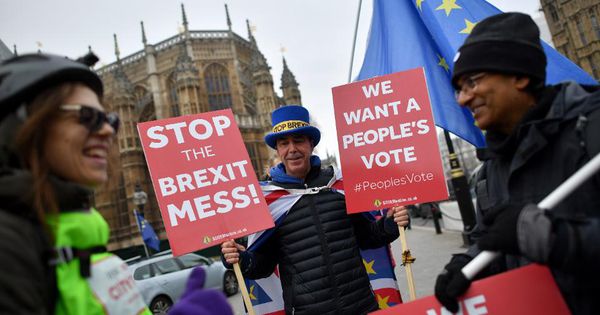
Pro-European Union (EU), anti-Brexit demonstrators hold placards calling for a ‘People’s Vote’ as they protest outside the Houses of Parliament in central London. (Photo: BEN STANSALL/AFP/Getty Images)Getty
How is that Brexit thing working out for the United Kingdom (UK)? Seems pretty good if you are selling antidepressants, based on the results of a research report published in the Journal of Epidemiology and Community Health.
What is Brexit? Well, that seemed to be the question that many people in the UK were asking Google after they voted on June 23, 2016, on whether Britain should leave the European Union (EU). That day approximately 52% of the voters in the UK opted for Brexit, which stands for “British exit from the EU.” Since this vote, two of the most Googled terms in the UK have been “what is Brexit” and “what is the EU,” the latter of which is analogous to asking “whom exactly have I been married to” after you decide to get divorced. The EU, in case you haven’t Googled it yet, is an economic and political union that allows 28 European countries to cooperate and collaborate for a variety of issues and policies. Essentially, the UK is saying blank-U to the EU and will go it more alone in some form or another. The UK got actual formal divorce proceedings rolling in March 2017 and has until March 2019 to leave. Soon everyone in the UK will get to see the true consequences of their vote and actions.
Brexit has thrown the country into a period of uncertainty. Economists have warned that Brexit may lead to a downturn in the British economy. Fintan O’Toole wrote for The Guardian about how English nationalism has been driving Brexit. Indeed, there have been reports of increased explicit racial, ethnic, and religious intolerance and discrimination in England since the vote. Rolling Stones lead singer Mick Jagger even penned and sang “England Lost” and “Gotta Get A Grip,” which Josh Robertson described for The Guardian as “a pair of new songs that deliver grimly mocking takes on the age of Brexit and Trump.” Yes, you can’t always get what you want. But is this what the UK wants? Really, really wants?
So in the voice of Joey from the television series Friends, with all this going on, “UK, how you doin?” For the research report, a team from King’s College London and the Harvard T.H. Chan School of Public Health (Sotiris Vandoros, Mauricio Avendano, and Ichiro Kawachi) analyzed antidepressant prescription rates before and after the Brexit vote and compared these with prescription rates for other drugs less related to mental health such as medications for gout, diabetes, cholesterol, and iron deficiency. They used general practitioner prescribing data from the 326 voting areas in England from 2011 through 2016.
The analysis revealed that prescribing rates for all the medications studied had increased each year up to the 2016 Brexit referendum. After the vote, the number of antidepressants prescribed per capita continued to increased, albeit at a slower pace. By contrast, following the Brexit vote, the prescribing rates for the other medications actually decreased, meaning that the rates of antidepressant prescriptions went up by 13.4% compared to the rates for other medications. This suggests that relative rate of antidepressant use has increased since the UK decided to leave the EU, which stands for the European Union in case you are in the UK and still don’t know what you voted for in 2016.
Of course, these results do not prove that Brexit specifically is leading to worse mental health. There could be other causes of increased antidepressant use such as the breakup of One Direction or the record of the Manchester United football team. Increasing antidepressant prescriptions could also be the result of more people getting access to mental health services or coming forth with their issues and not necessarily a jump in the number of people experiencing mental health issues. Prescribing patterns and trends are complex and correlations and associations do not mean causation. Moreover, the Brexit vote could be the result of other underlying issues that are leading to mental health issues rather than the cause. For example, if people are unhappy with their lives, Brexit and the propaganda around it can be a way of shifting the blame to “outsiders” such as minorities, immigrants, and other countries rather tackling the real sources of people’s unhappiness.
Nevertheless, this study highlights how the overarching political environment can play a major role in people’s mental and emotional health. Politics are a health issue as well, even when you are not talking specifically about health care. Politicians can use tactics such as stoking fears, pitting people against each other, and stereotyping and scapegoating minorities, women, and other disadvantaged groups to distract others from the true issues and what politicians really should be doing. When voting, the big question is: which is more damaging to your health, what the candidates are blaming or what the candidates are doing?
